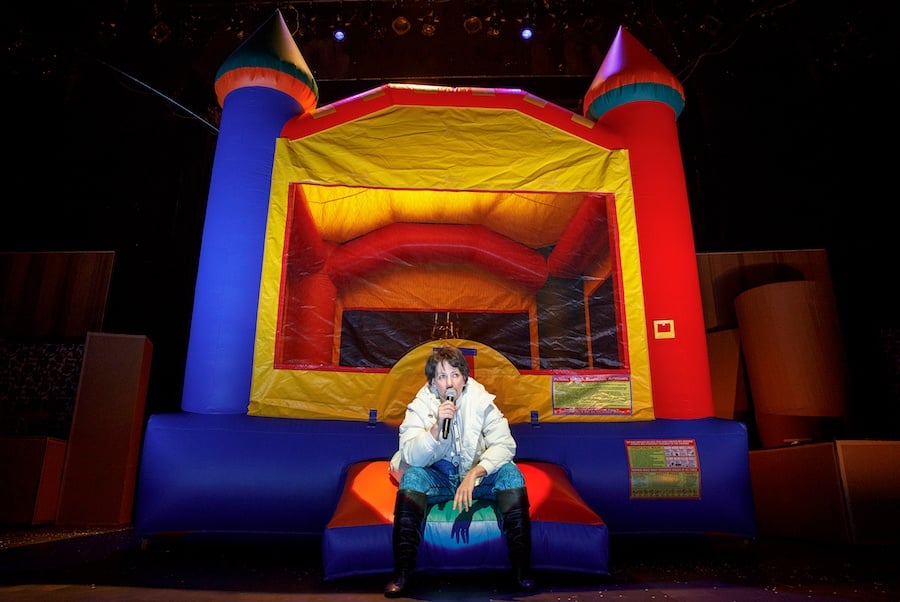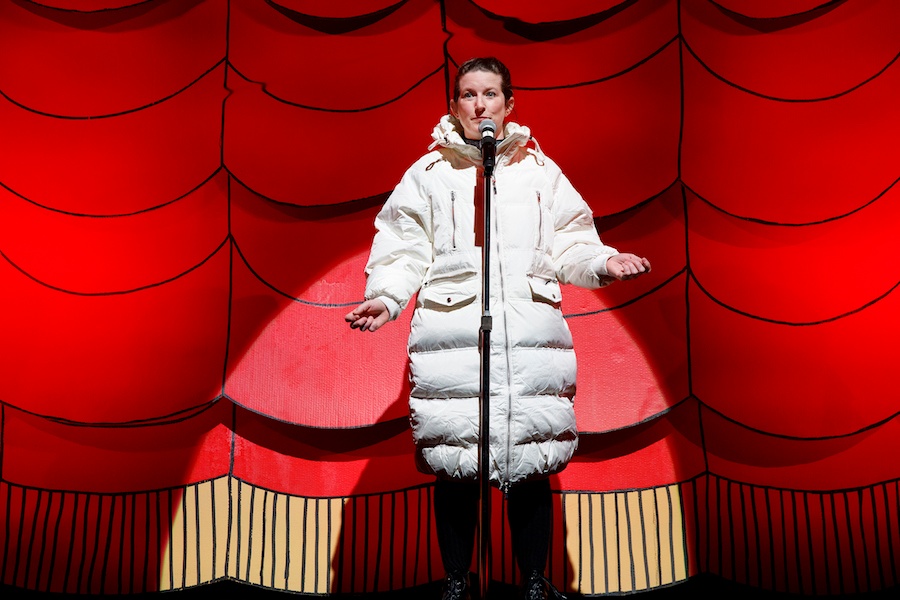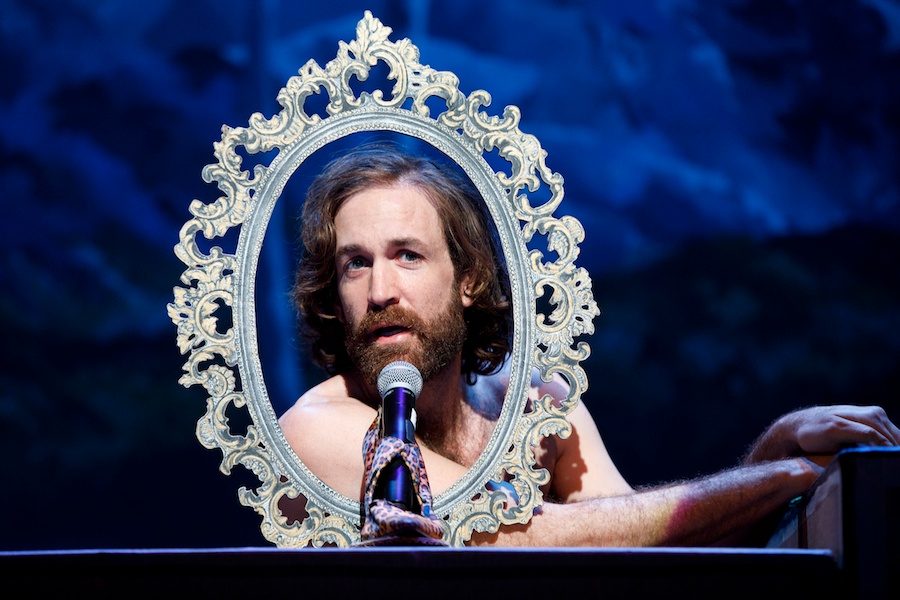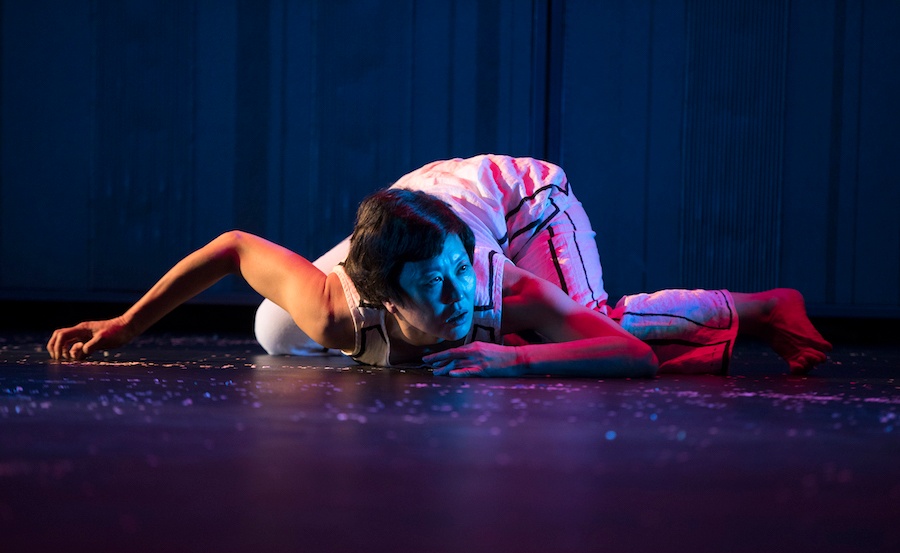
Lana Lesley in FIELD GUIDE created by Rude Mechs. Photo by Joan Marcus, 2018.
A room-sized, inflatable bouncy castle mushroomed out onto the empty set. It brushed away the thin, cardboard sidings to its anonymous, brown packing box—a stagecraft surprise betrayed only by a thin, trailing electrical cable. Triumphant choral music drowned out the hum and grind of the castle’s motorized prop fan. Strong, white, raking light elevated the spectacle to a silly sublime; the structure struggled heroically to overcome gravity and standard air pressure.
The appearance of a true-to-life bouncy castle tied off a gag introduced at the very start of Field Guide, an original, 80-minute play developed by the acting collective Rude Mechs now up at Yale Repertory Theater through Feb. 17.
Before embarking on an absurdist SparkNotes rendition of Fyodor Dostoyevsky’s The Brothers Karamazov (Brat'ya Karamazovy, 1879-1880), Rude Mechs’ Hannah Kenah performed a purposefully off-color standup routine, before a microphone stand and lurid red curtain, ostensibly as herself.
In particular, Kenah riffed on her ex and their “open relationship.” To groans and self-conscious squirming, she described how the romance ended after Kenah’s partner fingered a girl in a bouncy castle. She quickly clarified: the “girl” was of age and a grad student, the jumper was the ironic gimmick to a party. But the damage had already been done.

Hannah Kenah in FIELD GUIDE created by Rude Mechs. Photo by Joan Marcus, 2018.
Dmitri Karamazov (Lana Lesley, pictured at top) revisits this imagery in the canned voice-over to a campy, steamy, mid-play sex sequence with femme fatale Agrafena Alexandrovna Svetlova (diminutive “Grushenka,” played by Kenah). As Grushenka coolly watches Dmitri eat from a tureen of noodles she presses against her waist, she comments how she is “not a good person.”
“You know,” she continues, “I think I might get bored [in heaven]. I might not like perfection—maybe I don’t want a Crystal Palace.”
Dmitri looks up, mouth full but audio piping in clearly. “Maybe you want something dumber,” he asks. “Stupider?”
“Something empty, inflatable,” agrees Grushenka. “A place where I can stick my tongue out and who cares. Maybe I like to suffer.”
Grushenka here ventriloquizes the eponymous “Underground Man” from Dostoyevsky’s earlier Notes from Underground (Zapiski iz podpol'ya, 1864). It’s something of a recurring theme:
You believe in a palace of crystal that can never be destroyed—a palace at which one will not be able to put out one’s tongue or make a long nose on the sly. And perhaps that is just why I am afraid of this edifice, that it is of crystal and can never be destroyed and that one cannot put one’s tongue out at it even on the sly.
Admittedly, Dostoyevsky’s bitter curmudgeon takes a satirical swipe only at the steel-and-glass dachas from Nikolai Chernyshevsky’s utopian 1863 novel What is to Be Done? (Chto delat’?). The blow-up is all Rude Mechs’ license.

Thomas Graves in FIELD GUIDE created by Rude Mechs. Photo by Joan Marcus, 2018.
At first glance, the jumper house is a clever way to update the Underground Man’s “hen house”—his unserious alternative to Chernyshevsky’s Crystal Palace—for a modern audience. At a slightly deeper level, bouncy castle and Crystal Palace demarcate the fine line that Rude Mechs walk all throughout Field Guide. The collective faces down two competing, contradictory tendencies that these images combine like the face and obverse of a coin.
On the one hand, Rude Mechs are subterranean. Much like the Underground Man, they thumb their nose at the monumental edifice of great Russian literature with gleeful abandon. The ensemble enters Yale Rep farcically on clacking snowshoes. Phlegmatic patriarch Fyodor Pavlovich (Lowell Bartholomee) appears as a goat in a literal satyr play and takes a dump on stage. Family intelligent Ivan Karamazov (Thomas Graves) recites his seminal Grand Inquisitor prose-poem naked from the waist up behind a frilly vanity mirror into a microphone mounted on a leopard-print, peep-toe high-heeled shoe.
On the other, Rude Mechs need the essentializing allure of great Russian literature intact to put butts in seats. (“Cerebral” was the word bandied about the most on the opening night’s preshow hum and buzz.) It’s an allure best caricaturized by Ivan with his messy, long hair; his beard, walking stick, and charcoal frock coat; his jokes about Schopenhauer, Hegel, and Nietzsche. Yet despite these jokes and many others, Rude Mechs never escape the gravity well of their weighty subject matter.

Mari Akita in FIELD GUIDE created by Rude Mechs. Photo by Joan Marcus, 2018.
Simply put, they protest too much. Even when the Mechs dismiss Dostoyevsky outright with colloquialisms like “Action, you know! That’s easy! It’s harder to depict spiritual longing—” or “—but literature, you know? Hard to follow!” they call attention to the complexity of the interpretive problem at hand. They don’t do themselves any favors by immediately following both of these dismissals with apparently high-concept dances that have more to do visually with futurist operas, or suprematist art than 19th century Russia.
Rude Mechs try to float above Dostoyevsky, flattering an audience who is so sophisticated they can get along without sophistication. The result is a situation where the Mechs hope to have their cake and eat it too. Field Guide still trades upon a commonplace rampant in the United States that you can learn about Russians—that you can learn about life itself—through Russian literature. It goes right down to their title, which frames The Brothers Karamazov as a precis on the human condition. The play clings to this sensibility. Spicy garnishes of Russian language—your ya sushchestvuyu-s or ponimayesh’-es—aside, Field Guide stays very American in character.
Oh, sure: there’s a talking bear that cracks jokes about Putinist election hacking. But the real devil is in the dramaturgy. For example, someone knew about Russia’s dry sauna bathhouses but rendered them in ignorance as a Jacuzzi. The set’s matte painters had probably seen Alexei Savrasov somewhere; they got the snowy birches in the backdrop’s foreground right, but their mountains mean they didn’t grasp how Russia is flat, flat, flat. The cast staged a time-honored cliché of boozy recitations over Slavic tapas, but delivered it a little backwards: you declaim Pushkin, not prose and by rote, not by the book.
Maybe these slips are redemptive. Perhaps they’re knowing, Westernizing touches that degrade, or deconstruct Russia’s nationalist iconography. Likely they’re the design concessions needed to make these tropes legible to a non-specialist crowd. If so, they’d make an uncanny pastiche out of fetishized Russianness, something that would put the Mechs squarely back inside the underground’s bouncy castle.
On the whole, however, Field Guide remains reverential in spite of its irreverence, uncritically upholding the educative, art-into-life, morally fortifying aspect of Russian literature. It’s good, rollicking, fun—as colorful and lightweight as its inflatable arch-motif suggests.